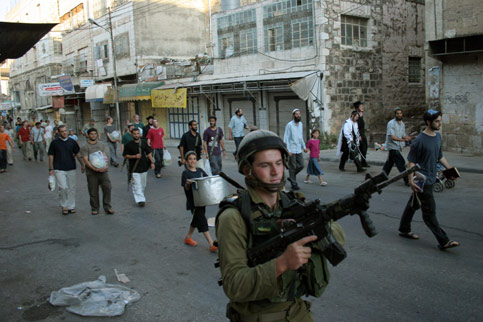6 juin 1987 : il est près de 22 H. les habitants du camp de réfugiés de Deheishe s’endorment. C’est le 20ème anniversaire de la Guerre des Six Jours et de l’occupation de la Cisjordanie. Les colons de Kyriat Arba, colonie édifiée au-dessus d’Hébron depuis 1967, qui ont pris l’habitude de venir agresser les Palestiniens de Deheishe, ont décidé de fêter l’événement.
Une centaine de « barbus », sous la conduite du rabbin Moshé Levinger et des adeptes du rabbin Meir Kahana, débarquent en voitures et taxis collectifs, et se mettent à lancer des pierres, à tirer à balles réelles sur les fenêtres des maisons, sur les ballons des chauffe-eau solaires, à mettre le feu aux voitures, à tout briser sur leur passage, jusqu’à ce que l’armée finisse par les repousser, après avoir aspergé les Palestiniens de gaz lacrymogènes pour les empêcher de riposter.
Ce que certains Israéliens qualifieront de pogrom se soldera par un couvre-feu… pour les Palestiniens du camp, et quelques heures de garde à vue pour les responsables du saccage, dont l’un des membres, un certain Ben Icha, dira au quotidien Haaretz le 7 juin : « Notre action n’était pas assez forte. Il aurait fallu écraser le visage d’un enfant de 8 ans et casser les dents d’une femme enceinte. C’est seulement de cette façon qu’ils comprennent ».
Ceci n’est qu’une des nombreuses agressions commises au fil des ans par les colons que le général Rafael Eytan a intégrés de fait dans l’organisation militaire de la Cisjordanie, leur fournissant des armes et couvrant leurs agissements. Qualifiés d’«éléments extrémistes» dans la presse, tandis que le ministre israélien de l’Habitat, David Lévy ne cesse d’inaugurer de nouvelles colonies, ils s’introduisent la nuit dans les souks, y détruisent les marchandises, répandent des pesticides sur les cultures, arrachent les oliviers, les citronniers et les vignobles. Le jour, ils défilent en toute liberté à Jérusalem, Hébron ou Gaza, sous la direction des membres du Kach et de Meir Kahane, réclamant la déportation massive des Palestiniens.

soldats ecortant les colons à Hébron
L’armée et le gouvernement sont au diapason. Ils dynamitent les maisons palestiniennes (pour « absence de permis de construire » ou en représailles collectives), les fabriques, confisquent des terres, multiplient les contrôles et fouilles humiliantes. Le 2 juillet, trois garde-frontières rentrent chez des ouvriers palestiniens logeant pendant la semaine à Tel-Aviv, détruisent tous les meubles, leur mettent la tête dans les WC et les obligent à lécher le sol. La Knesset vote le 27 juillet une loi visant à « rétablir une majorité juive en Galilée ». Le 20 août, les autorités israéliennes donnent l’ordre de démolir la mosquée de Rahit à Bi’r Al-Sab.
par CAPJPO-EuroPalestine
ENGLISH TEXT———————-
1987 I
Israeli settlers: those “enfants terribles”… armed and covered by the Israeli Defence Forces
6 June 1987: it was nearly ten o’clock in the evening, and the inhabitants of the Dheisheh refugee camp were going to sleep. It was the twentieth anniversary of the Six-Day War and the occupation of the West Bank. The settlers of Kyriat Arba, a colony set up near Hebron in 1967, who had developed the habit of going to attack the Palestinians of Dheisheh, decided to celebrate the event. About a hundred of them, led by the rabbi Moshe Levinger and followers of the rabbi Meir Kahana, turned up in cars and collective taxis and started throwing stones, firing bullets at house windows and solar water-heater tanks, setting fire to cars and generally destroying everything in their path, until the army succeeded in pushing them back, after spraying the Palestinians with tear gas to prevent them from responding.
What some Israelis later described as a pogrom ended in a curfew… for the Palestinians in the camp, and a few hours in police custody for the perpetrators of the havoc, one of whom, a certain Ben Icha, was to declare to the daily newspaper Haaretz the next day: “Our action wasn’t strong enough. We should have smashed an 8-year-old’s face and broken the teeth of a pregnant woman. That’s the only way to get them to understand.”
This was only one of many attacks committed over the years by the settlers who were de facto incorporated into the military organisation of the West Bank by the general Rafael Eytan, who gave them weapons and covered their activities. Described in the press as “extremist elements”, while the Israeli Minister of Housing and Construction, David Levy, continued to inaugurate new settlements, they broke into the souks at night to destroy the merchandise, spread pesticides on foodcrops, tore up olive trees, lemon trees and vineyards. By day, they paraded in all freedom in Jerusalem, Hebron or Gaza, under the direction of members of the Kach and Meir Kahane, calling for the massive deportation of Palestinians.
The army and government acted in tune. They blew up Palestinian houses and factories (on the pretext that they had “no building permit” or as a collective reprisal), confiscated land, and increased the number of humiliating checks and searches. On 2nd July, three border guards entered accommodation in Tel-Aviv where Palestinian workers slept during the week. They destroyed all the furniture, forced the Palestinians’ heads down the toilet and made them lick the floor. On 27 July, the Knesset passed a law aiming to “re-establish a Jewish majority in Galilee”. On 20 August, the Israeli authorities issued a demolition order on the mosque of Rahit in Beer el-Sabe.
By CAPJPO-EuroPalestine


